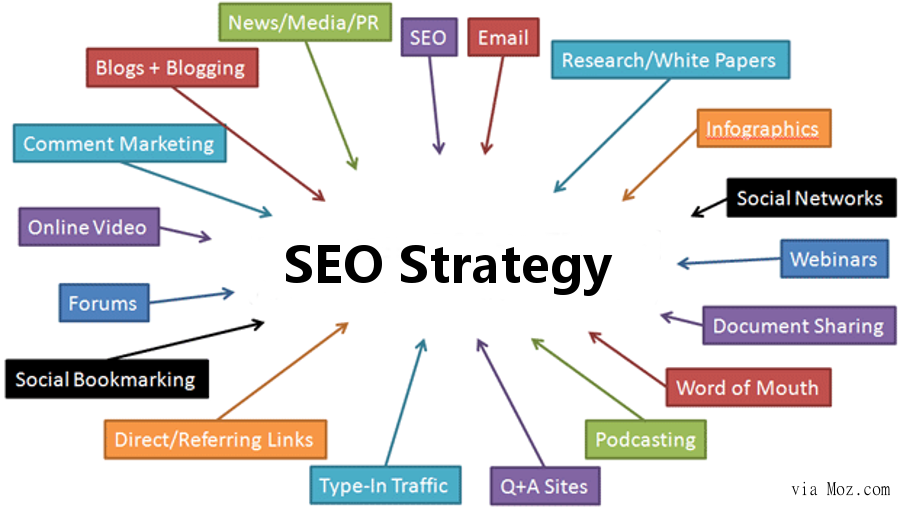The Ultimate Guide to Building an Effective SEO Strategy in 2025

Table of Contents
A well-crafted SEO strategy is essential for any business looking to dominate search engine rankings and drive quality traffic. Whether you’re a local shop, an e-commerce store, or a global enterprise, implementing the right SEO strategies can help you achieve your goals efficiently.
This guide breaks down the core elements of developing an effective SEO strategy, from keyword research to user experience enhancement. By integrating these practices, you can position your website as a trusted source in your industry.
Keyword Research Optimization
The foundation of every SEO strategy lies in effective keyword research optimization. Identifying and targeting the right keywords ensures your content reaches the audience actively searching for your products or services.
For example:
- SEO keyword strategy involves selecting high-volume and low-competition keywords relevant to your niche.
- Utilize tools like Google Keyword Planner, SEMrush, or Ahrefs to analyze search intent and identify long-tail keywords.
By focusing on specific phrases such as “developing an effective SEO strategy” or “ecommerce SEO strategy,” you can improve your site’s relevance and visibility.
Responsive Design Implementation
A responsive website design ensures your site is user-friendly across all devices, including desktops, tablets, and smartphones. With Google’s mobile-first indexing, this is a non-negotiable aspect of modern SEO strategies.
Benefits of responsive design:
- Improves user experience by adapting to screen sizes.
- Reduces bounce rates, which is critical for SEO optimization strategies.
- Enhances your ranking for mobile searches, particularly in a local SEO strategy where mobile users dominate.
High-Quality Backlink Building
A strong SEO backlink strategy is one of the most effective ways to build authority. High-quality backlinks signal to search engines that your content is valuable and trustworthy.
Key tactics:
- Collaborate with authoritative websites in your niche.
- Leverage guest blogging to reach new audiences while earning backlinks.
- Use competitor analysis to discover backlink opportunities they are capitalizing on.
Backlink building is especially crucial for industries that rely on enterprise SEO strategy or international SEO strategy, where credibility and domain authority matter.
Video Content Integration
Video content is becoming a cornerstone of SEO content strategy. With the rise of platforms like YouTube and the increasing preference for video over text, integrating video content is essential for engaging your audience and improving rankings.
How to use video content:
- Create tutorials, product demos, or explainers relevant to your audience.
- Optimize videos with keywords like “SEO optimization strategies” in the title and description.
- Embed videos on your website to increase dwell time and reduce bounce rates.
Quality Copywriting Investment
Quality content is the backbone of any SEO and content strategy. Investing in professional copywriting ensures your site delivers value while incorporating the right keywords naturally.
Best practices:
- Craft compelling headlines that include keywords like “B2B SEO strategy” or “local SEO strategy.”
- Structure content with short paragraphs, bullet points, and headings for readability.
- Write for humans first and search engines second, keeping your audience engaged.
Strategic Content Marketing
Strategic content marketing ties together all other aspects of your SEO strategy. By creating valuable, consistent, and relevant content, you can build long-term relationships with your audience.
Content ideas to fuel your SEO strategies:
- Publish blog posts that answer common questions like “What is an enterprise SEO strategy?”
- Develop resource pages that link to valuable tools or articles.
- Create pillar content and topic clusters to organize your site around main themes.
This approach not only boosts your rankings but also aligns perfectly with a B2B SEO strategy, where educating the audience is key.
User Experience Enhancement
User experience (UX) plays a pivotal role in developing an effective SEO strategy. A website that’s easy to navigate keeps users engaged, increases conversions, and reduces bounce rates.
Focus areas:
- Ensure fast loading times using tools like Google PageSpeed Insights.
- Simplify site navigation with intuitive menus and clear CTAs.
- Optimize for accessibility, catering to users of all abilities.
An enhanced UX pairs perfectly with a local SEO strategy, where users often search for quick, location-specific information.
AI Tools Collaboration
The rise of AI tools has revolutionized how businesses approach SEO. Incorporating AI-powered solutions can save time and improve accuracy in crafting and executing an SEO content strategy.
Popular AI tools:
- ChatGPT: For generating content ideas and streamlining research.
- Surfer SEO: For optimizing content structure based on data-driven insights.
- Ahrefs AI: For identifying keyword opportunities and backlink gaps.
Using AI tools ensures efficiency and scalability, especially for complex needs like an international SEO strategy or ecommerce SEO strategy.
Resource Center Development
A resource center consolidates valuable content into one place, positioning your website as an authority in your field. This strategy aligns with both SEO content strategy and SEO optimization strategies.
What to include in a resource center:
- FAQs that answer search queries like “What is an SEO strategy?”
- E-books, guides, and downloadable assets.
- Links to relevant blog posts and videos.
For example, a well-structured resource center could be crucial for a B2B SEO strategy, where decision-makers look for comprehensive solutions.
Efficient Link-Building Planning
Planning your link-building efforts ensures sustainable growth in domain authority and search rankings. An SEO backlink strategy works best when executed with precision.
Steps to an effective link-building plan:
- Audit existing backlinks to identify gaps and opportunities.
- Prioritize high-quality domains with relevant content.
- Monitor progress using tools like SEMrush or Ahrefs.
Efficient link building supports long-term success in enterprise SEO strategy and boosts visibility for competitive keywords like “SEO strategies.”
Start Building Your Winning SEO Strategy Today
Ready to implement these proven SEO strategies for your business? Get in touch with Hypercharge SEO agency now!
- Up to 5 times more calls
- And up to 3 times more walk-ins

